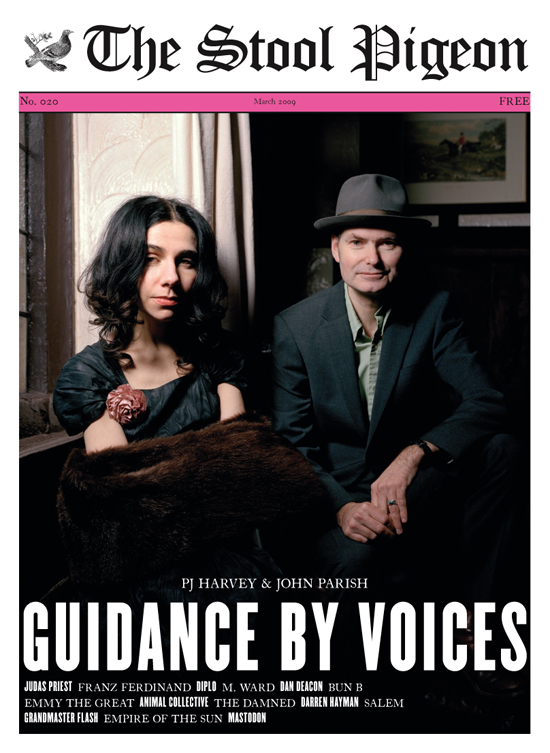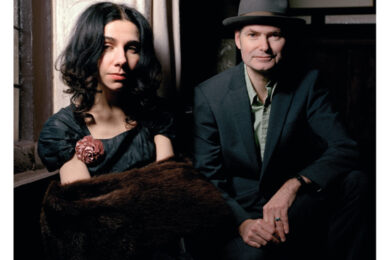PJ Harvey and John Parish are sat in a comfortable and welcoming pub in a small village near where the latter grew up and near the even smaller village where Polly was raised. She lets out a victorious ‘Yes!’ when ‘Green Onions’ by Booker T and the MGs is piped into the little dining room we are sitting in next to an open fire. Outside of the window a tiny stream separates the road from a line of thatched cottages and the wind playfully aggravates the trees. Thin strips of blue are visible through scratches in the otherwise grey white expanse of sky. It must be the first nice day of the year so far. Inside she luxuriates in the company of John, enjoying being teased by him when she voices fear that there may be gas leaking from the fire and giggles fitfully when the interviewer stumbles over his words.
Why did you decide it was time to make another joint record?
Polly: We’d talked about it and we knew we would for many years. I think in the back of our minds we were always going to continue this writing journey together. John is usually producing my work or playing on my work. We’re always in touch with each because we’re good friends and constantly talking about each others’ work anyway so it seemed pretty natural that we would do another album together. And then I think it was in 2005, I was just finishing writing the songs that would become ‘White Chalk’ and I just felt this huge urge – that the time was right – to work with John again. [puts on luvvie voice] I was at that stage in my creative cycle where I really, really needed that inspiration of working with him closely again. And also I needed to dive into a musical landscape that wasn’t natural to me. I wanted to be thrown into something that was going to force me to have to come up with new ideas. And I knew from the past and working with John’s music does that because it’s something I could never produce myself and so in terms of singing and lyric writing I go into areas that I would never go into left to my own devices.
So is this tactic of engineering various situations to avoid entropy something that you both rely on? The obvious example being Polly, you learned to play piano in a short space of time for ‘White Chalk’? Is this something you both need, to throw obstacles in your own paths?
John: I think that neither of us are interested in repeating ourselves. You find that repeating yourself is a very easy thing to do. So you do need to find of ways of throwing up obstacles so you don’t go down the same path. I tend to work with a lot of different people, working as a producer or musician or writing music for a film or whatever so things automatically set me off in other directions. Polly is more focussed on doing her own records so – it seems to me – it is necessary for you to make a definite decision to do something yourself to change things. [she nods] ‘White Chalk’ obviously was primarily on an instrument that you hadn’t explored before. I think it’s very easy just to do something different but I think you need to find something that isn’t just different for the sake of being different. Looking for a way of moving forwards and not stagnating or not relying on things that you have done before.
I think the story of how you two met is uncharacteristically sweet for the genesis of a rock and roll partnership.
John: A friend of mine, a guitar player called Jeremy who used to play in my old band, came down to a party in the West Country where he bumped into Polly who was in the back garden playing guitar and singing songs. He came back and said ‘Oh I’ve met this girl who sings songs and she has a great voice, you should meet her. This was a few months before we were looking for a guitarist for the band. There was something about the way that he described Polly that made her interesting to me. And then when we met and she started giving me tapes of her songs I just thought that there was something indefinable about her . . . because she was young and they were young person’s songs but there was something older in her voice that I related to. And I also related to her as a person when we met. Which was at her birthday party.
Polly: [whispering] Eighteenth.
John: Her eighteenth birthday party! I think occasionally you meet people and something clicks and I felt that she was . . . I felt that I trusted her opinions even though . . . [turns to her] You were a young old person. [Polly nods] You were very naive on many levels but there was something about the way you considered things I found I could relate to from a very early stage and we both started relying on each other. And that was when I’d say we started collaborating from when we first met and we’ve been collaborating ever since and we’ve relied on each other’s opinions and trusted each other’s opinions.
There are obviously a lot of different voices on the new album; a lot more so than on ‘White Chalk’. Nearly every song has a different voice. These vignettes, epiphanies, scenes, are they acting in any sense?
Polly: They aren’t, no. It’s hard for me to sit here and tell you that it’s not contrived in any way because that would sound utterly fake but I can honestly say that each song needs to be sung in the way that you hear it. I don’t myself unravel why that is, I just know that in order to deliver the lyric that meets the music absolutely appropriately it has to be sung in a very specific way and I somehow know how that is by just being open to that and listening. I just listen to what the music needs and what the words need to deliver them in a way that can be the completely right combination of words and music and singing. So they each have to be that way. When I think of my voice, I treat it in the same way as the instruments that I play. You choose a particular instrument to deliver a particular emotion that you want to get across. On a song here I reach for that instrument in my vocals to get across the right emotion. In some ways my voice is a hundred different instruments and I just choose which one is going to be best for those words and that music.
And sometimes that requires pulling something quite extreme out of the bag!
Polly: Yes!
Do you even surprise yourself?
Polly: Very often yeah. And sometimes I’ll try and not sing them in the way that I naturally will go for. I will just stop, take a second and think [very prim voice] ‘Well, this is very strange. Should I be doing this?’ [laughs]But then it feels right and with the title track for example I had quite a few different attempts at before I could find how it worked. The only way I could match the music was to sing it in a voice like that delivering a lyric like that.
I’m sure the chicken liver marketing board will be made up with the lyrics [I once knew a woman man/A courageous friend I thought/It turned out so wrong was I/When we were against the wall/He had chicken liver balls!/He had chicken liver spleen!/He had chicken liver heart!/Made of chicken liver parts/Lily livered little parts!/Lily livered little parts!/Prematurely going bald/Any passion long gone cold/But I wanted to explore/the damp alleyways of his soul/All the times I tried to help/he spit in my face and laughed/That woman man/I want his fucking ass/I want his fucking ass!/I WANT YOUR FUCKING ASS!]
[laughter from Polly]
What is the creative trait in the other person that you cherish the most?
Polly: John’s creative judgement. He is a very hard critic and a very astute judge of what is good and bad. And I trust his opinion implicitly and I always have. And he’s usually right. Dammit! [laughs] But not always! His judgement and I trust him wholeheartedly as a person to give me that judgement. And I’d trust him with my life, so that’s also a safe environment to actual grow in as a writer and a song writer.
This is an edited extract of an interview with John Parish and PJ Harvey from the current issue of The Stool Pigeon newspaper. Also in the February edition: Mastodon, Franz Ferdinand, Judas Priest, Darren Hayman, The Damned, M Ward, Dan Deacon, Grandmaster Flash and more. For a list of stockists, visit the Stool Pigeon website



